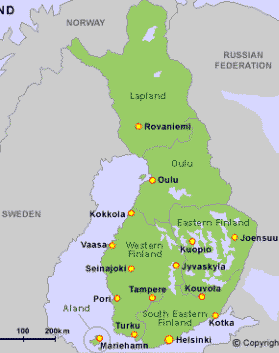Finnish Cuisine and Recipes
Finnish Recipes and cooking
Cooking
by Country -
April 2007
Scroll
down for Finnish Recipes
Go To:-
Finland
Featured Ingredient |
Finland Speciality Dish |
Cooking by Country Main Page
 |
Finland is the fifth largest country in
the European Union (EU) and is the most northerly state on the mainland
of Europe.
The terrain is dominated by lakes
(literally thousands) and abundance of forests which account for over
60% of land surface interspersed with mainly flat to rolling plains.
Finland has a 1,250 km coastline on the Baltic Sea, Gulf of Bothnia, and
Gulf of Finland and land borders with Norway, Russia and Sweden.
The climate ranges from sub-arctic in the
north, particularly Lapland where temperatures get as low as -30C in the
winter to temperate in the south and east reaching +23�C during summer.
|
Ancient
times and Influences on Finnish cooking
Archaeological excavations suggest that people
were living in Susiluola over 100,000 years ago during the interglacial periods.
Post-glacial, the oldest artefact to have been found so far, a fishing net has
been carbon dated at c10,000 years old . This and many other sites show a
population who survived main as hunter-fishers with elk, seal and beaver being
hunted for their meat and skins. They were skilled in making spearheads from
slate and were highly developed stoneworkers. It is believed these peoples first
migrated to southern Finland from the East and gradually moved northwards.
The oldest signs of organised agriculture date to around 2300BC although until
c1500BC fishing, hunting and trapping was still practiced by many, who lead a
nomadic lifestyle based around the migration of reindeer. However people also
began to settle along the fjords, inland waterways and on the coast and added
cattle raising to their trapping and fishing skills. In the interior of southern
Finland arable farming and animal husbandry had already become established.
In early times, Finnish cooking was heavily influenced by the severe climate.
Fresh fruit and vegetables were not readily unavailable for much of the year and
this gave rise to a reliance on tubers such as turnips, dark rye bread and
fermented dairy products for much of the year. Very few seasonings other than
salt were available as fresh herbs were also limited to the few summer months.
For this reason berries have also always played a major part in the Finnish
diet.
Preserving of meats and fish by means of drying or smoking was also practiced
and in this regard, it�s interesting to note that the sauna played its part in
this process from
early times � certainly from the 5th century AD and possibly much earlier. Not
only was meat and sausages smoked in the sauna, but also malt was dried. Whilst
originally a smoke stove was used for the dual purpose of a heating the dwelling
place and as a
sauna, it wasn�t at all ideal for cooking and by the 11th century, a stove
and closed oven replaced the open smoke stove and the sauna became a separate
room.
From the 12th century until the early 1800s, Finland was part of Sweden after
which it became part of Russia. Both these countries have influenced Finnish
cuisine including the Russians introduction of mushrooms to the cuisine. Finland
eventually declared itself independent in 1917.
Current
Day Finnish Cuisine
Finland's cuisine is still hearty although, as with many other western
countries, haute cuisine and continental style cooking, including spices and
herbs from both the east and west, has been incorporated. The use of ingredients
such as rye, oats, barley and berries is still popular however the traditional
use of tubers such as turnips as the main root crop has been superseded by potatoes since their
introduction in the 18th century.
The majority of people eat three meals a day, breakfast, lunch and dinner,
Breakfast consists of items such as porridge, open faced sandwiches, muesli, cereals, yoghurt and
bread. Lunch is often just a sandwich for working people and is generally eaten
much earlier than in many countries, at around 11am although hot meals are
served in most schools at lunchtime. Likewise, dinner is also
served quite early, 5-6pm and is fish, meat, poultry or game served with a
variety of fresh vegetables.
Everyday food still tends to be simple and fresh. All manner of fish is still
very popular as are meats such as reindeer, moose, beef and pork, sausage
products including a type of black pudding and game. Fresh vegetables
and all dairy products remain popular. The tradition of serving berries such as lingonberries
and cranberry sauce with meat stills holds today and bread is
still an important item.
|
|